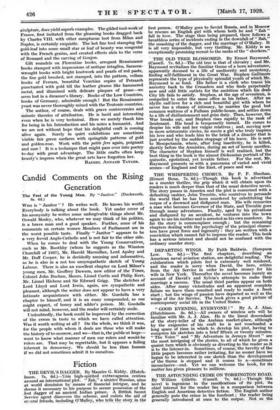THE OLD TREE BLOSSOMED. By Ernest Raymond. (Cassell. 7s. 8d.)—The
old tree is that of chivalry • and Mr. Raymond revitalizes the familiar theme of a born adventurer, apparently doomed to a life of mediocrity and monotony, finding self-fulfilment in the Great War. Stephen Gallimore represents the type of physically splendid youth of which Mr. Raymond is so fond. His father is a clerk who traces his ancestry back to the Crusaders and who finds perpetually new and odd little outlets for the ambition which his drab City life fails to satisfy. Stephen, at the age of seventeen, is compelled to enter the same office as his father. After an idyllic calf-love for a rich and beautiful girl with whom he never has a chance of intimacy, he marries the good but common waitress of a Fulham public-house, and settles down to a life of disillusionment and grim duty. Then, however, the War breaks out, and Stephen rises rapidly to the rank of lieutenant. His head is temporarily turned. He comes to despise his wife and her vulgar relatives • and, moving now in more aristocratic circles, he meets a girl who truly inspires his love and who leads him to the brink of a disaster that is just averted by the sudden stoppage of his leave. He is sent to Mesopotamia, where, after long inactivity, he is killed, shortly before the Armistice, during an act of heroic sacrifice. The character of Stephen himself is well realized, but the best thing in the book is the almost Dickensian portrait of the quixotic, egotistical, yet lovable father. For the rest, Mr. Raymond presents us with a panorama of varied and vivid scenes—of England and the East, of peace and war.










































 Previous page
Previous page